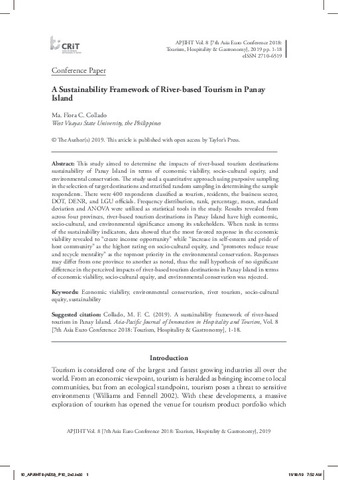A sustainability framework of river-based tourism in Panay Island
Share
Zusammenfassung
This study aimed to determine the impacts of river-based tourism destinations sustainability of Panay Island in terms of economic viability, socio-cultural equity, and environmental conservation. The study used a quantitative approach using purposive sampling in the selection of target destinations and stratified random sampling in determining the sample respondents. There were 400 respondents classified as tourists, residents, the business sector, DOT, DENR, and LGU officials. Frequency distribution, rank, percentage, mean, standard deviation and ANOVA were utilized as statistical tools in the study. Results revealed from across four provinces, river-based tourism destinations in Panay Island have high economic, socio-cultural, and environmental significance among its stakeholders. When rank in terms of the sustainability indicators, data showed that the most favored response in the economic viability revealed to “create income opportunity” while “increase in self-esteem and pride of host community” as the highest rating on socio-cultural equity, and “promotes reduce reuse and recycle mentality” as the topmost priority in the environmental conservation. Responses may differ from one province to another as noted, thus the null hypothesis of no significant difference in the perceived impacts of river-based tourism destinations in Panay Island in terms of economic viability, socio-cultural equity, and environmental conservation was rejected.
Beschreibung
7th Asia Euro Conference 2018: Tourism, Hospitality & Gastronomy
Recommended Citation
Collado, M. F. C. (2019). A sustainability framework of river-based tourism in Panay Island.Type
Conference publicationISSN
2710-6519Keywords
Serie
7th Asia Euro Conference 2018: Tourism, Hospitality & Gastronomy;Collections
- Conference Papers [15]



